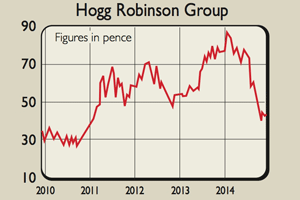
Rising stockmarkets have made it much harder to find very cheap shares over the past year. When you do stumble across something that looks cheap, there is often a good reason why it’s cheap.
So finding a ‘gamble’ candidate for this column often involves identifying a company that has one or two big problems that have depressed its share price. If the problems can be resolved, then anyone who buys in now might make a nice profit from the recovery.
But if the problems can’t be sorted out, then the losses may keep stacking up. That’s why it’s a gamble, of course!
And this week’s candidate looks like a very risky proposition indeed. Hogg Robinson (LSE: HRG) is a corporate travel agent that makes most of its money organising travel schedules for its clients’ staff.
Until 2014 it had been doing quite well, with dividends rising by 70% since 2010. This year has not been so kind – the shares have more than halved since peaking in January.
Why? It looks like the company’s cost base is out of kilter with how it generates its income. As with any high-street travel agency, more bookings are taking place over the internet. But Hogg Robinson had not expected so many of its clients (nearly half) to switch so fast. This left it with too many offices and staff burning a hole in its profits.
The good news is that this problem looks like it can be dealt with. Offices are being shut. More than £20m in cost savings is being targeted over the next three years. What’s even more encouraging is that revenues are holding up reasonably well. It has kept hold of most of its existing clients and has won more business than it has lost.
The outlook in the UK and US is reasonable, but the weak European economy is making business sluggish there. That said, the business can probably grow at 2%-3% a year – in line with the expected growth in the corporate travel market.
Cash generation is good, and debt fell by more than a quarter between March and September this year. But the company’s massive pension-fund deficit could be a problem.
At £189m, it dwarfs the market value of the shares (£137m) and could threaten the solvency of the company if times get very tough. This – combined with the subdued trading performance this year – explains why the shares look so cheap.
They trade on just over six times earnings and offer a dividend yield of 5.2%. That dividend looks safe for now. I won’t deny it – the shares could be a classic value trap (a stock that looks cheap, but ends up continuing to slide). However, it’s making a lot of effort to get its house in order and the shares could at least be due a bounce.
Verdict: very risky buy at 42p